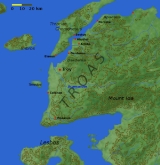
in what is now Turkey
, southeast of the Dardanelles
and beside Mount Ida. It is best known for being the setting of the Trojan War
described in the Greek Epic Cycle and especially in the Iliad
, one of the two epic poems attributed to Homer
. Metrical evidence from the Iliad and the Odyssey
seems to show that the name Ἴλιον (Ilion) formerly began with a digamma
: Ϝίλιον (Wilion).
[to his soldiers] Myrmidons! My brothers of the sword! I would rather fight beside you than any army of thousands! Let no man forget how menacing we are! We are lions! Do you know what's there, waiting beyond that beach? Immortality! Take it! It's yours!
![]()
[to Hector] There are no pacts between lions and men.
![]()
[to Briseis] I'll tell you a secret, something they don't teach you in your temple. The Gods envy us. They envy us because we're mortal, because any moment might be our last. Everything is more beautiful because we're doomed. You will never be lovelier than you are now, and we will never be here again.
![]()
At night I see their faces: all the men I've killed. They're standing there on the far bank of the river Styx, waiting for me. They say "Welcome, brother."![]()
The Gods only protect the strong.![]()
Men are haunted by the vastness of eternity. And so we ask ourselves: will our actions echo across the centuries? Will strangers hear our names long after we are gone and wonder who we were, how bravely we fought, how fiercely we loved?
![]()
If they ever tell my story, let them say that I walked with giants. Men rise and fall like the winter wheat, but these names will never die. Let them say I lived in the time of Hector, tamer of horses. Let them say I lived in the time of Achilles.![]()
I've fought many wars in my time. Some I've fought for land, some for power, some for glory. But I suppose fighting for love makes the most sense of all.![]()

